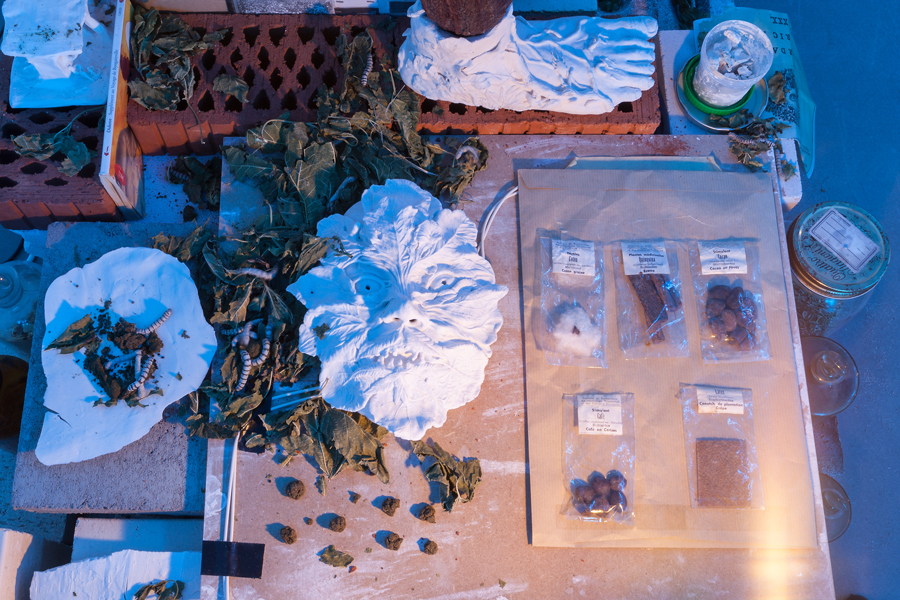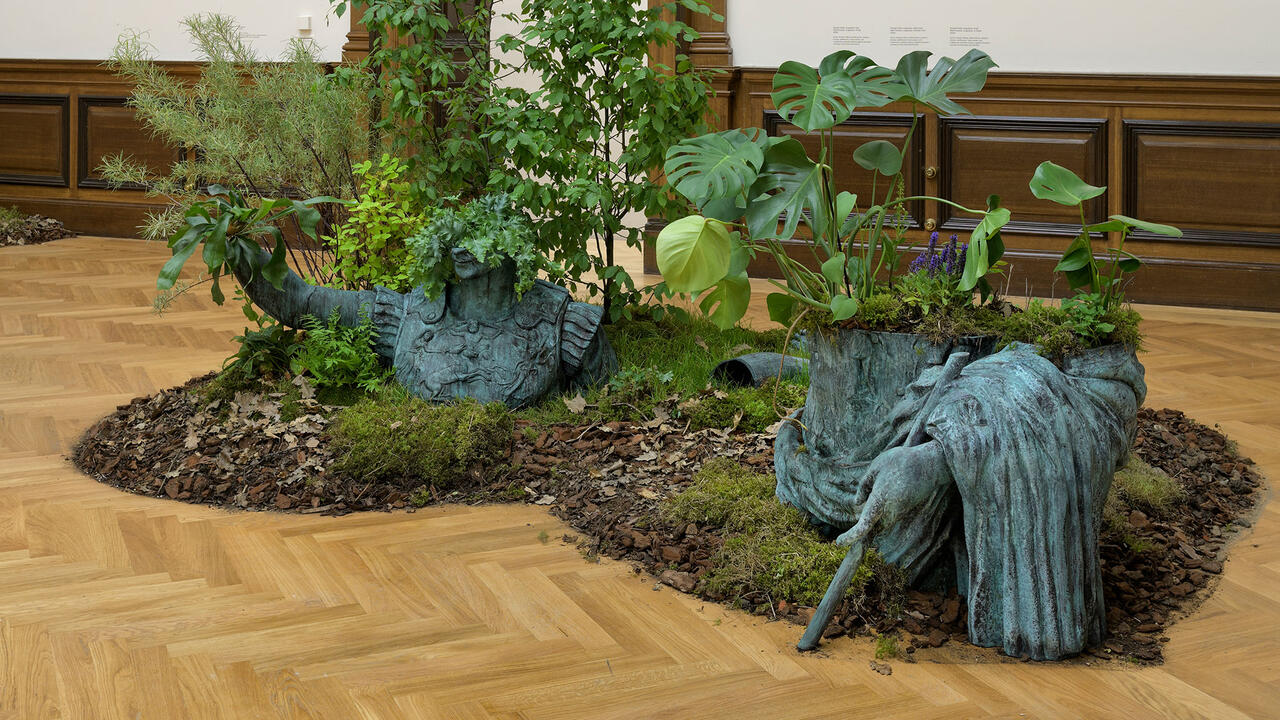A Different Light: Candice Lin's Sensual Elsewhere
Questioning the way that we interact with violent colonial histories at Portikus, Frankfurt
Questioning the way that we interact with violent colonial histories at Portikus, Frankfurt

‘A Hard White Body, a Soft White Worm’, Candice Lin’s solo exhibition at Portikus, drops us into a sensual elsewhere, the space dim, humid and heavy with the odour of vegetation. We are, it seems, underwater: a dark plastic sheet marked with floral motifs stretches overhead, while another shimmers beneath projected lights, like the surface of the sea. Throughout the space are several low-rise archipelagos of bricks, wood and cardboard. Lit by faint bulbs, they function as makeshift display platforms for texts, objects, fluids, organisms and other materials associated with colonial history.
On one such display, an underlined passage in an open book reads: ‘Life in that room seemed to be occurring underwater.’ The extract is from James Baldwin’s novel Giovanni’s Room (1956), which revolves around precarity, social alienation and the politics of race, class and sexuality. Baldwin’s text inspired this show’s previous iteration, which was presented at Bétonsalon in Paris last year, and included a bed of unfired porcelain (A Hard White Body, 2017). Porcelain sustains Lin’s interest in multilayered inscriptions of colonial legacy, attached as it is to a history of exoticism, Western desire and global trade.

This bed re-emerges at Portikus, although here it has been fired, broken into pieces and scattered. Its hard, white body is now fragmented, thereby conjuring the longing and loss of Baldwin’s novel, as well as the fear of a life that will never comprise a whole. Within this same display is a drawing, Here They Drown Algerians (2017), based on a photograph of graffiti scrawled on the St Michel Bridge in Paris, which denounces the bloody repression of peaceful Algerian demonstrations in 1961. Amid the ambiance of the show, such affinities of intimate, isolated questioning and covert violence appear even more suffocating.
Other characters are summoned through texts, drawings and objects, such as Jeanne Baret: expert botanist, the first woman to circumnavigate the globe and another who, like Baldwin, was entangled in complex negotiations of power. A draft text, co-written by Baldwin and Bobby Seale in 1975, proposes the publication of a ‘fantastic, analytical, almost blasphemous dialogue’ on topics connected to black liberation, women’s liberation, sexuality and pan-Africanism. Despite his politically active role, Baldwin was dismissed by the Black Panther Party for his homosexuality. Baret, in turn, was forced to borrow identity and dress as a man, as women were forbidden from boarding French naval ships. Her botanical knowledge was overshadowed by that of fellow botanist Philibert Commerson, both her employer and lover.

Lin questions the way that we interact with the past, something visualized by the video The Beloved (2017), which comprises images captured by the artist in various museums. History, here, is usurped by speculation, and additional components further stretch the potential of the exhibition as an apparatus to produce new genealogies. In one corner, a detox herbal tea is boiling, linking the idea of purity of body to race and class. Silkworms, another colonial good that in the 19th century fell victim to a disease that threatened to destroy one of the major French industries, crawl everywhere, raising a whole ecosystem that is in need of constant maintenance.
Lin places a high level of importance upon cycles, accentuating constant exchange between environments and bodies while simultaneously forbidding hierarchies and classifications. ‘People are out there today,’ reads an exhibited text, which goes on to claim that a drowning body will never make it to the seafloor intact, as it will be eaten and processed, again and again. While such exchanges might prove as perilous as they are potentially supportive, presented here, within Lin’s world of questioning, they bring solace. They suggest that, in spite of everything, dominant structures will continue to be challenged; that speculative thinking will forever represent a sensual elsewhere within which we can assess things in a different light.
'Candice Lin: A Hard White Body, a Soft White Worm' in on view at Portikus, Frankfurt until 8 April.
Main image: Candice Lin, 2018, installation view, Portikus, Frankfurt. Courtesy: Portikus, Frankfurt; photograph: Helena Schlichting
























